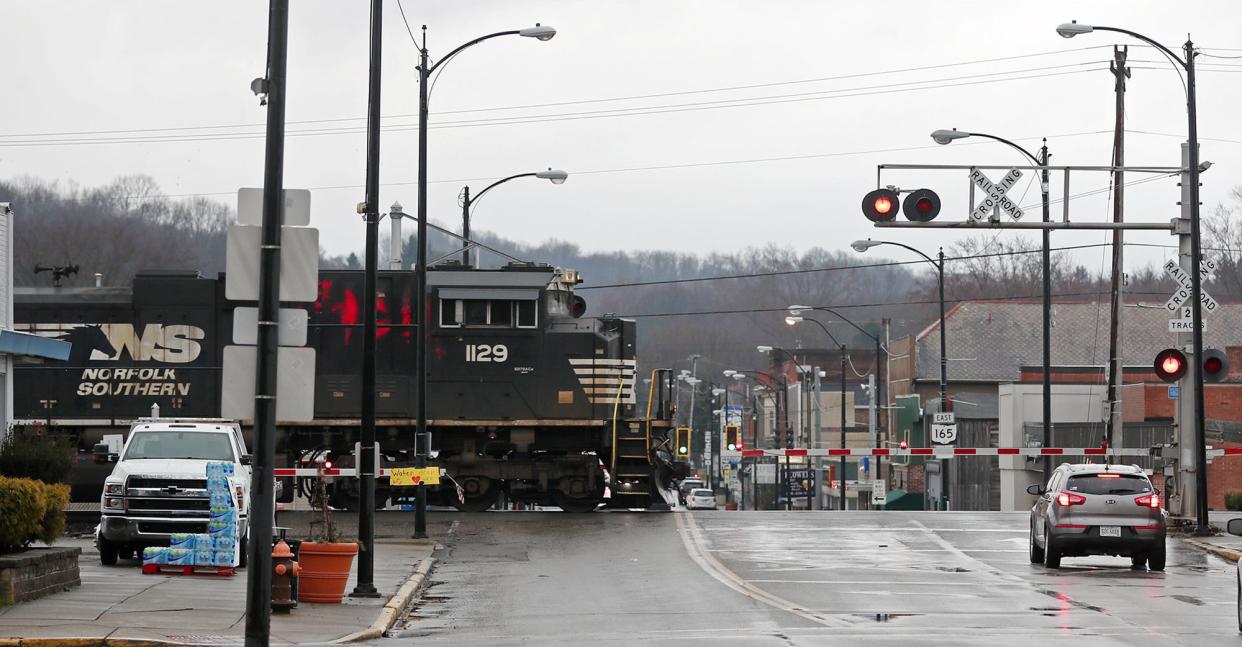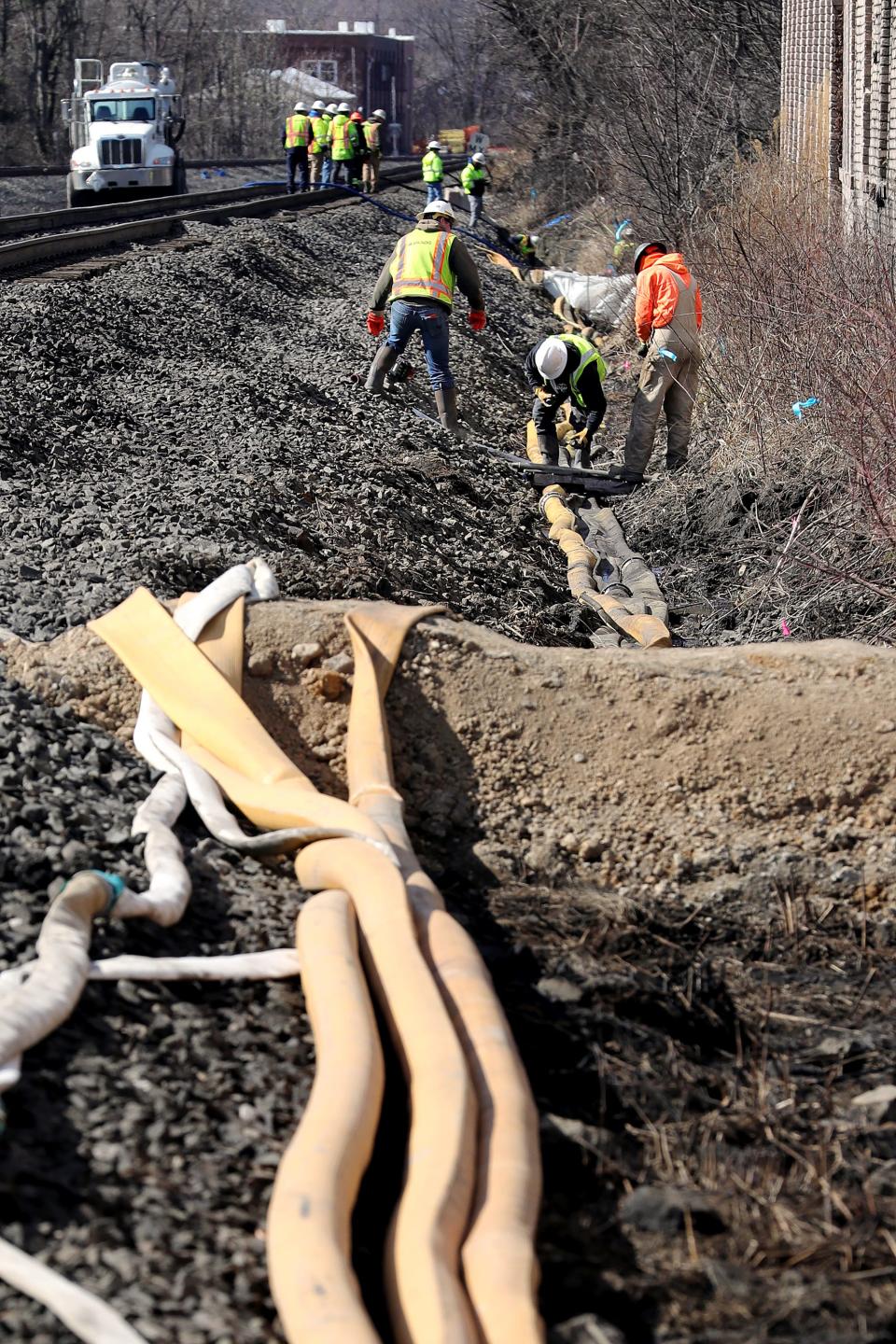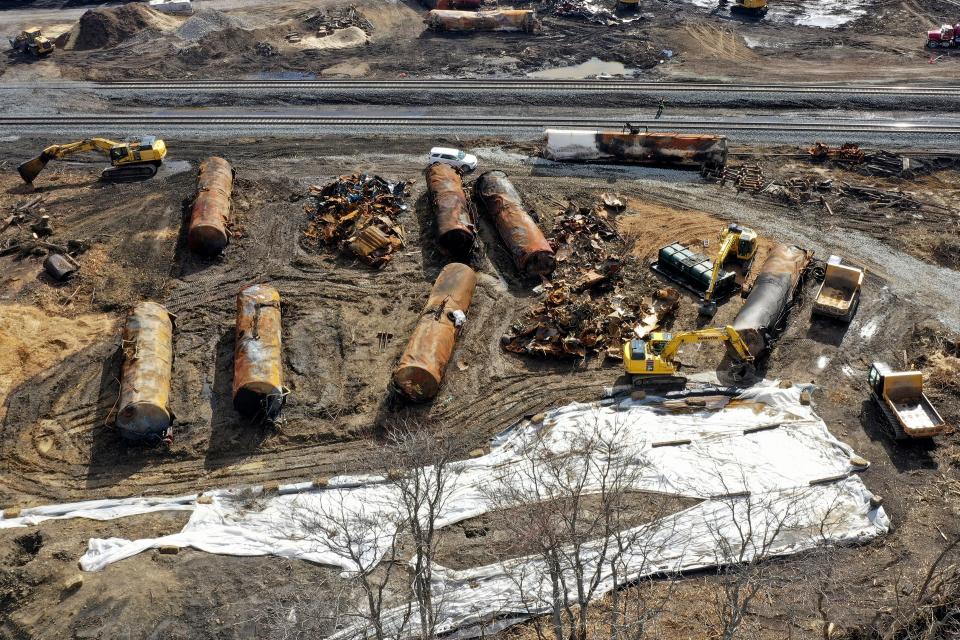Norfolk Southern to install more detectors as feds continue East Palestine derailment probe

While Norfolk Southern Corp. announced Monday it would take steps to improve rail safety, the National Transportation Safety Board is considering urgent safety recommendations that could apply industrywide, according to NTSB Chair Jennifer Homendy.
The railroad said it would undertake a six-point plan, based on the NTSB's preliminary findings following the East Palestine derailment and subsequent hazardous chemical release.
According to the four-page report, released three weeks after the Feb. 3 incident, the derailment happened as the train was traveling 47 mph in a 50 mph zone through East Palestine when a hot-bearing detector along the track issued an alarm instructing the crew to stop.
The report said data shows a bearing on the train's rail car No. 23 is likely the derailment's primary cause. Three detectors along the line measured the bearing's temperature increasing from 38 degrees above ambient temperature about 30 miles west of East Palestine, to around 100 degrees above about 20 miles west of the crash site, to 253 degrees above in East Palestine.
"Surveillance video from a local residence showed what appeared to be a wheel bearing in the final stage of overheat failure moments before the derailment," the report said.
New Tuesday:Norfolk Southern worker killed Tuesday in mishap on tracks at Cleveland steel plant
In announcing its initiative, Norfolk Southern President and CEO Alan H. Shaw said the company is not waiting for the NTSB's final report before it takes action.
"Reading the NTSB report makes it clear that meaningful safety improvements require a comprehensive industry effort that brings together railcar and tank car manufacturers, railcar owners and lessors, and the railroad companies," he said.

Norfolk Southern outlines six safety measures
The railroad said it plans to deploy about 200 more hot-bearing detectors to its network of tracks, with the first to be placed on the western approach to East Palestine. Such detectors are on average about 14 miles apart. Norfolk Southern said it will add the devices after evaluating sites where detectors are more than 15 miles apart.
The railroad said it would also work with manufacturers to develop advanced hot-bearing detectors capable of scanning a greater cross section of a rail car's bearings and wheels.
Norfolk Southern also intends to "work with the industry on a comprehensive review of standards and practices for the use of hot bearing detectors," including reevaluating the temperature at which detectors are triggered.
In addition to hot-bearing detectors, the railroad will add 13 acoustic bearing detectors on high-traffic areas of Norfolk Southern's core system. The company currently has five such detectors, which analyze the acoustic signature of vibration inside rail car axles.
Norfolk Southern said it is also partnering with Georgia Tech Research Institute to develop a new safety inspection technology, which uses high-resolution cameras, machine vision "and algorithms powered by artificial intelligence to identify defects and needed repairs much more effectively than traditional human inspection."
It plans to install the new technology on the railway that connects the Midwest and Northeast, which is the line that runs through East Palestine, it said.
Finally, Norfolk Southern has agreed to join the Federal Railroad Administration's Confidential Close Call Reporting System (C3RS). In doing so, it will join 19 other railroads, including Amtrak, and will be the only major freight railroad to participate.
According to the Federal Railroad Administration, the system "provides a safe environment for employees to report unsafe events and conditions and employees receive protection from discipline and FRA enforcement. In addition, railroads receive protection from FRA enforcement for events reported within C3RS."

NTSB continues review, considering recommendations
In an interview Monday on Washington Post Live, Homendy said she expects the investigation of the East Palestine derailment to be finalized within a year to 18 months.
She said the NTSB can still issue safety recommendations before the report is complete.
"In fact, we do, and we are considering in this case issuing urgent safety recommendations, and what that means is we don't wait till the end," she said. "If we see something urgent, we will issue safety recommendation right away so that action can be taken not just by Norfolk Southern, but the entire railroad industry."
Homendy said recommendations may involve tank cars, training or other issues, such as staffing and maintenance.
"One thing we are going to look at is whether any changes in staffing led to any differences in how these cars are maintained or how they're inspected," she said. "That is something we will look at as part of this investigation, and if we find something, that will also be contained in our final report."
She also addressed the question of electronically controlled pneumatic brakes, which some have claimed would have made a difference in East Palestine. An Obama administration rule requiring railroads to install ECP brakes on certain trains was rescinded in 2017 by the Trump administration.
Even if the train had been equipped with ECP brakes, "Car 23 still would have derailed because the wheel bearing failed," Homendy said. "There still would have been a derailment, there still would have been a fire and we, the responders and Norfolk Southern and the state and locals would have had to still make a decision on whether to vent and burn the five vinyl chloride tank cars ... it really would not have made a significant difference in this derailment."
Eric Marotta can be reached at emarotta@gannett.com. Follow him on Twitter @MarottaEric.
This article originally appeared on Akron Beacon Journal: Norfolk Southern to install more detectors; feds consider safety rules

